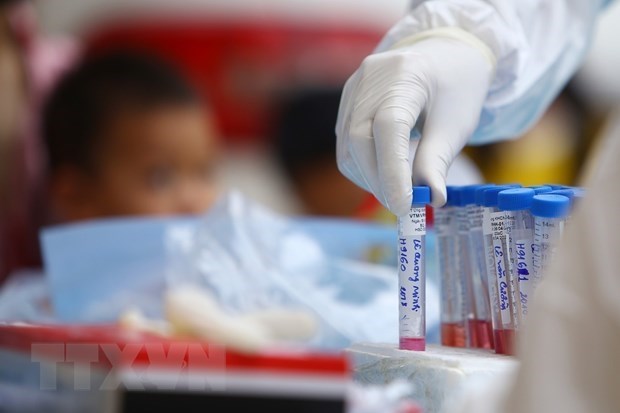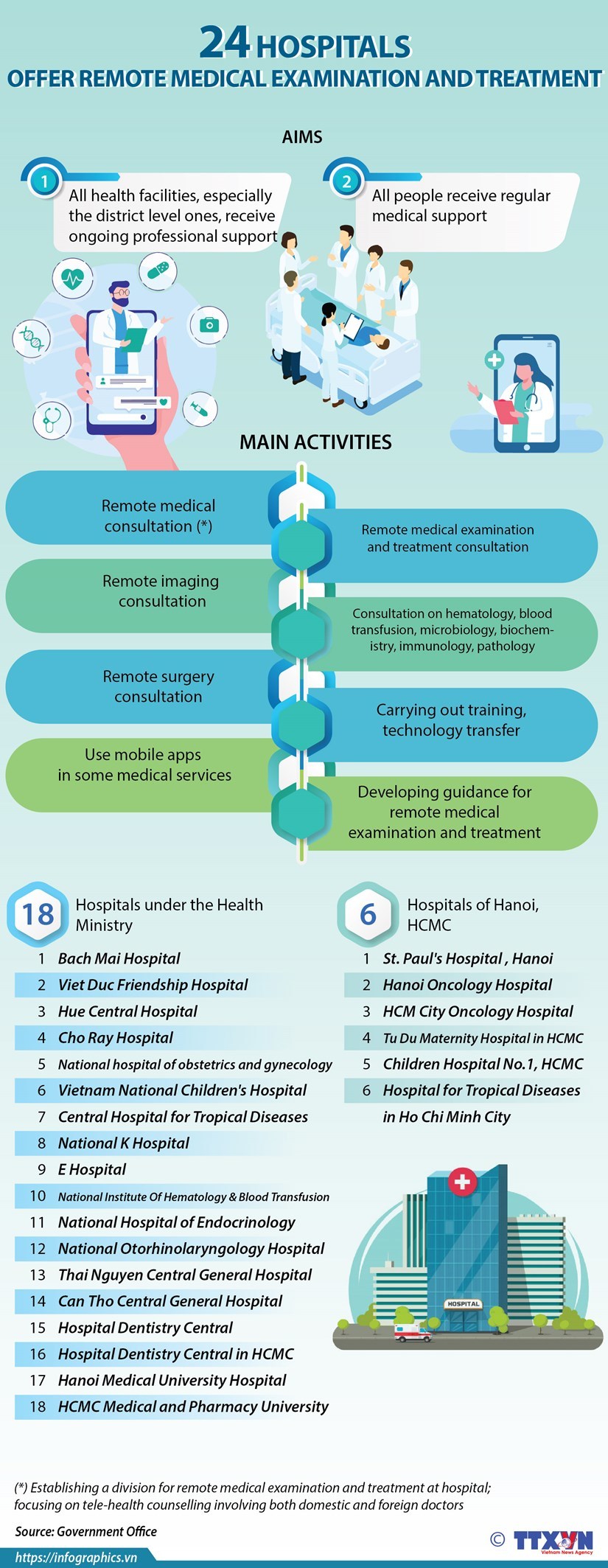 |
|
|
The common goal of the plan is to detect COVID-19 cases for timely monitoring, quarantine and treatment.
The National Institute of Hygiene and Epidemiology, Pasteur Institute, Health Departments, and the Centres for Disease Control were also asked to report testing activities to the ministry in line with regulations.
As of September 13, there were 137 labs nationwide eligible for SARS-CoV-2 testing using Real-time RT-PCR method with a maximum capacity of over 51,125 samples per day.
Among over 1 million samples tested, as many as 1,063 were positive for the virus.
Vietnam reports no new COVID-19 infections on September 22 morning
No new COVID-19 cases were recorded overnight, making the tally stay unchanged at 1068, the National Steering Committee for COVID-19 Prevention and Control said on September 22 morning.
As of 6am on September 22, Vietnam had 691 domestically-transmitted cases, including 551 reported since July 25.
To date, 947 patients have been treated successfully and there have also been 35 deaths linked with the coronavirus SARS-CoV-2, mostly elderly people with serious underlying health conditions.
Among 121 active patients, 15 have tested negative for the virus SARS-CoV-2 that causes COVID-19 once, two others twice, and 19 thrice.
Currently, there are 23,725 people having close contact with confirmed cases or coming from pandemic-hit regions under quarantine.
According to the steering committee, at present, COVID-19 outbreaks in Vietnam are basically put under control, but there remains a risk of infection in major urban areas if locals are subjective in disease prevention and control.
People nationwide are advised to continue wearing face masks, wash their hands regularly, keep distance with others, avoid crowed gatherings and make health declarations.
Foreigner tests positive for Covid-19 after leaving Vietnam
A Sri Lankan man has tested positive for Covid-19 after he returned home from Vietnam.
The information was given by Bui Thi Ngoc Hieu, vice chairwoman of HCM City’s District 7 People’s Committee at the city’s meeting on Covid-19 prevention and control on Monday.
Right after the 32-year-old man had the positive test result, Sri Lanka’s authorities informed Vietnam of the problem.
The HCM City Centre for Disease Control has cooperated with District 7 to sterilise the area where the patient had been living for over the past 28 days. Local authorities have defined 15 people who had close contact with the man and all have tested negative for the virus.
Among these people, 11 were those who came into contact with him at the New Hotel in District 7. They are being quarantined at the hotel, while the others are isolating themselves at their home.
At the meeting, director of the municipal Department of Health Nguyen Tan Binh, said that the city has arranged 25 paid hotels which can serve a total of 2,529 people.
Le Thanh Liem, vice chairman of the HCM City People’s Committee said that the city has seen no new Covid-19 infections over the past 52 days. However, people should not ignore virus prevention as the pandemic remains complicated in many countries.
ASEAN members discuss supportive measures for vulnerable families in COVID-19 pandemic
The COVID-19 pandemic has caused great impacts on vulnerable families such as ethnic minority households, families with informal labourers and migrants, leading to temporary poverty due to low incomes, experts have said.
Speaking at the 15th ASEAN GO-NGO Forum on social welfare and development held virtually yesterday, representatives agreed these families need to have their resilience and solidarity strengthened to overcome adversity and adapt to the new normal.
This year's annual event is themed 'Strengthening Family Resilience and Solidarity: Braving the Adversity and Adapting to the New Normal', with a focus on coping with the COVID-19 pandemic.
Hà Thị Minh Đức, deputy director of the Ministry of Labour, Invalids and Social Affairs’ International Cooperation Department, said the pandemic has spread globally since early this year and caused challenges for all countries.
The pandemic has also caused many negative impacts on the lives of all people in society, especially women, children and vulnerable families.
In Việt Nam, more than 30 million people are estimated to have been affected by the pandemic, with half of them suffering a pay cut.
In rural areas, half of all households have experienced a 38 per cent decrease in their income from farming.
Đức said most Vietnamese families were large with many generations living under the same roof and the pandemic has greatly affected their income and livelihoods.
It has also affected quality and access to essential social services such as maternal and child health care as well as education and support services for these households.
Đức said the Government has stepped up its dual task to control the pandemic and develop the economy to ensure a stable life for people.
The support package of more than VNĐ62 trillion (US$2.7 billion) to support 20 million affected people would help solve the problem. Online studying has also been applied in many schools to ensure education for children.
At the forum, experts shared stories on family relations and the role of families and measures to protect families in the ASEAN community.
Philippines loosens overseas travel ban on medical workers
Philippine President Rodrigo Duterte has recently decided to ease an overseas travel ban on the country’s nurses and other medical workers to allow more to take jobs abroad.
Those Duterte exempted from the ban will now include any workers with overseas contracts and documentation completed as of August 31, his spokesman Harry Roque told a media briefing on September 21. He added that the president’s decision would benefit 1,500 health personnel.
Healthcare workers from the Philippines are on the front lines of the pandemic at hospitals in the United States, Europe and the Middle East as well as at home.
The government in April barred nurses, doctors and other medical workers from leaving, saying they were needed to fight the coronavirus crisis in the Philippines, which is still tackling its first wave of infections.
The country has the highest number of recorded coronavirus infections in Southeast Asia with 286,743 cases, including 4,984 deaths.
On the day, Indonesia reported 4,176 new cases – the highest number recorded in one day. The tally now reaches 248,852, including 9,677 fatalities.
Singapore invents COVID-19 swab test robot for safe, fast procedure
A robot carrying out nasal swabbing to diagnose COVID-19 has been developed by Singaporean clinicians, who say the automated procedure is safe, faster and more comfortable compared with manual swab tests.
The machine, which is 35cm by 40cm, and 49cm high, was developed by clinicians from the National Cancer Centre Singapore (NCCS) and Singapore General Hospital (SGH), in collaboration with medical robotics company Biobot Surgical.
The team said the robot can address the limitations and risks of manual swabbing. It reduces swabbers' risk of exposure to the virus and the need for training people, standardises the consistency of swabs taken, and increases the efficiency of conducting swab tests.
Although similar robots have been developed in other countries, the made-in-Singapore bot was said to be the first that allows patients to fully control the swab process so they are more comfortable. Patients can activate and terminate the machine at will.
With the robot, the testing process takes 20 seconds, while a manual swab test can take twice as long.
To date, 85 patients and volunteers have participated in the ongoing clinical trial that compares SwabBot against manual swabbing. The participants’ feedback received was positive.
SingHealth and Biobot Surgical have filed a patent for SwabBot's technology. Biobot is also working to commercialise the robot.
 |
|
|